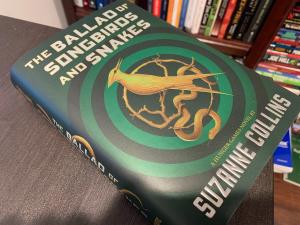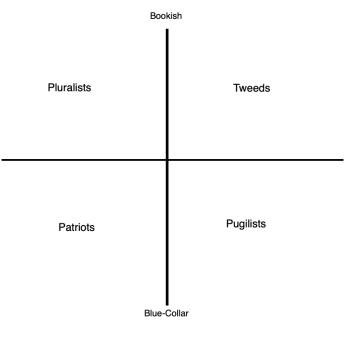 Like Nietzsche’s madman, Suzanne Collins’s Hunger Games trilogy may have come too soon. In the decade or so since its heyday, it’s become easy to write off the series as a momentary teen-lit sensation that prompted a flurry of terrible imitators. (Remember Divergent? That’s okay, neither does anyone else.)
Like Nietzsche’s madman, Suzanne Collins’s Hunger Games trilogy may have come too soon. In the decade or so since its heyday, it’s become easy to write off the series as a momentary teen-lit sensation that prompted a flurry of terrible imitators. (Remember Divergent? That’s okay, neither does anyone else.)
But the Hunger Games series looks rather different in 2020 than it did upon release. Most notably, the books’ central motif—the struggle of a ravaged Appalachia to withstand a decadent Capitol elite—seems like it could’ve been pulled from Hillbilly Elegy or any post-2016 exploration of “the other America.” It is surely an uncomfortable fact, for a young-adult fiction market increasingly obsessed with ideological purity, that Collins planted her flag squarely on the side of the “deplorables” well before the term was ever coined—though the class war she depicts feels crushingly relevant today.
And, of course, the most haunting feature of her novels is their staunch refusal to provide pat conclusions. Never is the reader allowed to believe, naively, that more democracy or more idealism will save the day. Instead, all three books—Mockingjay in particular—display an unrelentingly grim view of human nature, building toward one of the bleakest conclusions I can recall in any mass-market YA fiction.
Collins’s new prequel volume—The Ballad of Songbirds and Snakes—follows in the same vein. Unexpectedly (and controversially), Ballad turns out to be an origin story for Coriolanus Snow, the villainous president of the reconstructed totalitarian America known as Panem (memorably portrayed by Donald Sutherland in the film series). And though it largely trades the pulpy thrills of the original trilogy for harder-edged philosophizing, the book still carries a vicious sting.
Ballad begins on the eve of the tenth Hunger Games, long before Katniss Everdeen ever set foot in the arena. These early Hunger Games, coming as they do in the wake of massive warfare and economic devastation are a tawdry affair. In place of the sophisticated, climate-controlled dome of the original trilogy, captive “tribute” children from the rebellious “districts” of America must fight to the death in a ruined athletic arena. The games are not glamorous spectacles, and the tributes are not celebrities: they’re half-starved children struggling to live long enough to enter the fray.
But success in the Games still carries certain advantages—as young Coriolanus, on the cusp of finishing high school, is well aware. It falls to Coriolanus, the last male heir of a once-proud family whose fortune was lost in the war, to restore the Snow name to glory. And he sets out to do just that by mentoring one of the tributes, Lucy Gray Baird, in the Hunger Games.
Certainly fans of the original trilogy will find much to like here. Early forms of the distinctive practices described in Collins’s original novel—sponsorship of combatants, the importance of manipulating the media, and so on—all show up, and Collins is as talented a plotter as ever.
For those who like their novels with a political edge, it bears mention that the class-war theme of Collins’s original trilogy is substantially nuanced here by the development of what Michael Lind has described as The New Class War: the struggle of the aspiring elites (the “top 10%”) against the established elites (the “top 1%”). Coriolanus is not, like the original novels’ Katniss, a rags-to-riches hero: he is a scion of longstanding privilege, hellbent on ascending through the meritocracy to reap the gains to which he believes he is entitled. But at every turn, as bills and creditors press in on the struggling family, he is reminded of his own inability to match the easy opulence of the truly moneyed. This tension in Snow’s soul naturally leads to the worst of all tendencies: a deep-rooted sense of inferiority, which can only be exorcised by the ruthless destruction of anything that might remind the ladder-climber of his humbler past, leading to domination without a sense of noblesse oblige. Surely Snow can say, with Frank Sinatra, “I did it my way”—collateral damage be damned.
At bottom, Ballad is Coriolanus’s story—but, more broadly, it is also a story of the logic of totalitarianism. The question of why suffuses the entire novel. Why does the Capitol of Panem need to glorify the killing of children? Why must the districts be suppressed so violently? Why was the war between Capitol and districts necessary in the first place? As Coriolanus comes to learn, through the tutelage of ruthless Gamesmaster Volumnia Gaul, the answer is quite simple.
What happened in the arena? That’s humanity undressed. The tributes. And you, too. How quickly civilization disappears. All your fine manners, education, family background, everything you pride yourself on, stripped away in the blink of an eye, revealing everything you actually are. A boy with a club who beats another boy to death. That’s mankind in its natural state. . . .
You can blame it on the circumstances, the environment, but you made the choices you made, no one else. It’s a lot to take in all at once, but it’s essential you make an effort to answer that question. Who are human beings? Because who we are determines the type of governing we need.
For those tempted to wonder “why liberalism failed,” Coriolanus and company are happy to provide an answer: human beings require “the strong hand of legitimate rule” lest they blunder into chaos and instability.
On its face this isn’t particularly interesting: lots of half-baked science fiction centers on the battle between bad autocrats and good democrats. But what makes Collins’s work so interesting, by contrast, is her unconventional answer to this question. The climax of Mockingjay is devastating precisely because it confirms Coriolanus’s grim philosophy of human nature: those bear the torch of liberalism or republicanism may be exactly as self-serving as the worst dictator.A “democratically elected” president may even bomb children in a false-flag operation calculated to shore up support.
What shall we make of politics, then? Collins doesn’t say, but a few elements of her work are suggestive.
Some of Ballad’s most haunting, understated moments advert to some lingering religiosity in dystopian America: one of Coriolanus’s friends bids farewell to a fallen tribute by performing a quiet ritual to ensure a peaceful transition to the next life, and talk of a hereafter—which Snow finds confusing—still lingers in remote districts’ folk songs. These are striking interruptions in the flow of an (almost unrealistically) secular series. And when they are read in conjunction with the gauzy, underdefined ending of the original trilogy—which found Katniss entirely abandoning the political realm in favor of domestic quietude—they hint that any lasting peace must, in the end, be totally eschatological. The political, in short, cannot ever save us.
Ballad, of course, is no one’s idea of groundbreaking literature. It wears its themes on its sleeve, and plenty of readers will be left unsatisfied by its jarring and unexpected ending. But like its predecessors, Ballad’s distinctive power is found in these jagged narrative edges, the moments where the story simply sinks its claws in for the kill. Suffice it to say that there are far worse beach books to read.
















